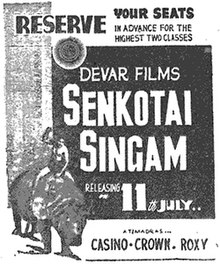Sengottai Singam
| Sengottai Singam | |
|---|---|
 Theatrical release poster | |
| Directed by | V. N. Reddy |
| Screenplay by | Puratchidasan |
| Story by | Rajagopal |
| Produced by | Sandow M. M. A. Chinnappa Thevar |
| Starring | Udaykumar B. Saroja Devi |
| Cinematography | V. N. Reddy N. S. Varma |
| Edited by | M. G. Balu Rao M. A. Mariappan |
| Music by | K. V. Mahadevan |
Production company | |
Release date |
|
| Country | India |
| Language | Tamil |
Sengottai Singam (transl. The Lion of Sengottai) is a 1958 Indian Tamil-language film directed by V. N. Reddy and produced by Sandow M. M. A. Chinnappa Thevar. The film stars Udaykumar and B. Saroja Devi, with Pandari Bai, S. V. Sahasranamam and E. R. Sahadevan in supporting roles. It was released on 11 July 1958.
Plot
The wealthy owner of the Sengottai estate orders for Lakshmi, a factory worker and her infant son to be killed because they came in the way of his car. Unknown to him, Lakshmi is his son Dharmalingam's lover and the mother of his son. His henchman secretly allows Lakshmi and her son to escape. Circumstances lead to the separation of the two, and the boy is raised by Malayandi, a tribal leader. Dharmalingam is grief-stricken that he has lost his lover and child, and refuses to marry the woman of his father’s choice. Meanwhile, Lakshmi's son is named Singam and grows up a fierce warrior who fights with animals and enemies. Singam later falls in love with a young woman. The rest of the film deals with how the family reunites.
Cast
- Udaykumar as Singam
- B. Saroja Devi as Singam's lover
- Pandari Bai as Lakshmi
- S. V. Sahasranamam as Dharmalingam
- E. R. Sahadevan as Malayandi
- C. L. Anandan
- Mynavathi
- Pushpalatha
Production
Sengottai Singam was the third production of Sandow M. M. A. Chinnappa Thevar's company Devar Films.[1] Its story was written by Rajagopal, and the screenplay by Puratchidasan. V. N. Reddy, a filmmaker based in Bombay, directed the film and also worked as cinematographer, while being assisted by N. S. Varma, an already established South Indian cinematographer.[2] M. G. Balu Rao and M. A. Mariappan jointly edited the film.[3] Shooting took place at Vijaya Vauhini Studios.[2]
Soundtrack
The soundtrack was composed by K. V. Mahadevan.[4] The song "Nadada Raja", written by Maruthakasi and picturised on Udaykumar's character riding an elephant, gained popularity.[2]
| Song | Singer/s | Lyricist | Length |
|---|---|---|---|
| "Illai Enum Solley" | Jikki | A. Maruthakasi | 02:55 |
| "Idhuvum Iraivan Leelaiyaa" | P. Susheela | 03:06 | |
| "Iru Vizhi Parugum Virundhu" | Jikki | 03:39 | |
| "Singakutti Andha Thangakatti" | 03:19 | ||
| "Nadadaa Raajaa Nadadaa" | T. M. Soundararajan | 04:11 | |
| "Ahaahaa Aasai Theera Aadalaamey" | T. M. Soundararajan & Jikki | 02:51 | |
| "Thogai Mayil Odaiyiley...Thenaruvi Paathaiyiley" | Velsamy Kavi | 03:11 | |
| "Seerum Sirappodum Selvam" | T. M. Soundarajan | 02:48 | |
| "Soorapathman Kodumai Thanai...Vel Vel Velavane" | T. M. Soundararajan & Nirmala | Puratchidasan | 04:25 |
Release and reception
Sengottai Singam was released on 11 July 1958.[3][5] Kanthan of Kalki said the film would disappoint those who had already seen Tarzan films.[6] According to historian Randor Guy, the film was not a major commercial success, but it gained much attention due to its music and onscreen animals, especially two horses named Iqbal and Dilip.[2]
References
- ^ "சாண்டோ சின்னப்பா தேவர்! (10)". Dinamalar (in Tamil). 11 October 2015. Archived from the original on 11 January 2017. Retrieved 11 January 2017.
- ^ a b c d Guy, Randor (11 October 2014). "Blast from the past: Sengottai Singam 1958". The Hindu. Archived from the original on 11 January 2017. Retrieved 11 January 2017.
- ^ a b "1958 – செங்கோட்டை சிங்கம்-தேவர் பிலிம்ஸ்-வீரசிம்ஹா(தெ-டப்)" [1958 – Sengottai Singam-Devar Films-Veerasimha(te-dub)]. Lakshman Sruthi (in Tamil). Archived from the original on 11 January 2017. Retrieved 11 January 2017.
- ^ Neelamegam, G. (December 2014). Thiraikalanjiyam — Part 1 (in Tamil) (1st ed.). Chennai: Manivasagar Publishers. p. 143.
- ^ "Senkotai Singam". The Indian Express. 11 July 1958. p. 10. Retrieved 4 September 2018 – via Google News Archive.
- ^ காந்தன் (27 July 1958). "செங்கோட்டை சிங்கம்". Kalki (in Tamil). p. 72. Archived from the original on 29 March 2023. Retrieved 29 March 2023 – via Internet Archive.
